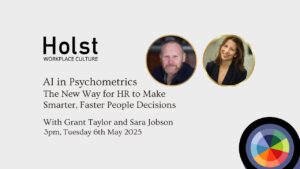Create a strong organisational culture with motivation, resilience and self-awareness.

“Creating a strong company culture isn’t just good business, it’s the right thing to do, and it makes your company better for all stakeholders - employees, management and customers."
Julia Hartz, co-founder and CEO of Eventbrite Tweet
Reason #1 - Motivation and engagement to go hand-in-hand
A motivated and engaged team is a recipe for success. Your teams and leaders want to do the best job that they can, to make a difference. Understanding what motivates your people and how to engage them is key to creating a strong Organisational Culture.
Motivation manifests in different ways for different people. Are your people driven by reward, or perhaps energised by purpose and challenge? Are they self-sufficient or do they prosper when working closely with colleagues?
There are several factors (or dimensions) within motivation. It is necessary to understand which dimensions are strongest and weakest, overused and underused and how this changes when the individual is under pressure, versus day to day. With these insights, you’ll know what really motivates, and therefore engages, each individual.
The subject of mental health training for managers appears almost daily in the HR press. While this may be appropriate in some settings, what managers really find valuable is to have a better understanding of their teams and how to engage them as individuals. This means having authentic conversations about workloads, workplace relationships and leadership style. What is key is having the right language, awareness and self-regulation for these conversations to deliver actionable insights. If people know they are listened to, they will be honest in their responses. These conversations can off the downward spiral that leads to poor wellbeing and mental health at work.
Reason #2 - A resilient workforce manages change, bounces back and overcomes challenges
An organisation that has a culture of organisational resilience has the tenacity to thrive, innovate and move confidently into the future.
While organisational resilience includes such factors as technology and its supply chain, its foundation is in its people. Without human resilience there is no one to manage the supply chain or reboot the tech.
Much of the burnout and boreout we have heard about is in part due to limited resilience. This isn’t a criticism, the last 18 months have been really tough for everyone. How can we learn from this extreme lesson and do better to manage change, bounce back from adversity and overcome challenges with a positive mindset?
“Resilience is not a muscle we are born with. We should never ask ourselves how much resilience we have, but rather how much we can build, and how we can build it into ourselves, our friends and the people around us.”
Sheryl Sandberg Tweet
The traditional view was that people are either resilient or they are not. However, this is not true. As Sheryl Sandberg says, resilience is like a muscle (or as we see it, a skill) which can be grown and trained. Ready to be put into action at a moment’s notice. To meet and beat challenges, we must be able to immediately switch on our resilience skills.
Reason #3 - People with higher self-awareness make more effective leaders
“The role of a leader is not to come up with all the great ideas. The role of a leader is to create an environment in which great ideas can happen.”
Simon Sinek Tweet
It is impossible to create such an environment without self-awareness – the ability to understand one’s impact on our environment and give others the space to flourish. Sure, we can try to create a workplace which suits us, but only through awareness and empathy can leaders create workplaces which meet the needs of its inhabitants.
A leader who creates the bedrock for great ideas without ego, creates the conditions for growth, creativity and innovation. Such innovation could be as simple as developing a better way to process invoices, all the way through to inventing a new market-dominating product.
Think of Ted Lasso who with his sublime self-awareness skills, gives kit-boy Nathan the opportunity to voice his innovative on-the-pitch strategy. Through recognising Nate’s contribution, Ted strengthens his leadership.
Organisations must value and actively promote self awareness within its HR framework. Without this critical skill, any investment in communication and creativity training reduces its ROI potential. Without awareness, communications are inauthentic and creativity is dampened.
“We cannot change what we are not aware of. And once we are aware, we cannot help but change.”
Sheryl Sandberg Tweet
Work with Holst to create a strong workplace culture
Being bold and innovative, focusing on growth instead of only weathering the storm, can help your organisation stay well ahead of competitors for years to come.
At Holst, we work with you to create the conditions for growth by adding robust professional development programmes to your existing HR framework. And, if you don’t yet have one, we will work with you to create a bespoke development framework to enable your people and your organisation to thrive. Contact us to learn more.
Contact us to learn more
flowprofiler® and associated marks are registered trademarks of Chalmers International Limited | All rights reserved
eqflow® and associated marks are registered trademarks of Chalmers International Limited | All rights reserved
resilienceflow® and associated marks are registered trademarks of Chalmers International Limited | All rights reserved
motivationflow® and associated marks are registered trademarks of Chalmers International Limited | All rights reserved





